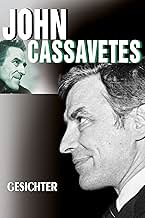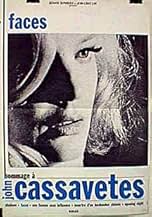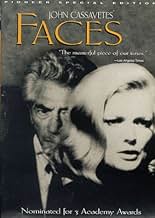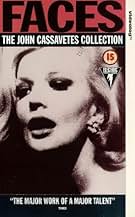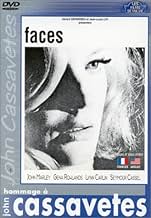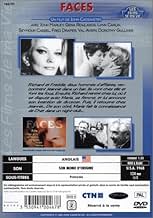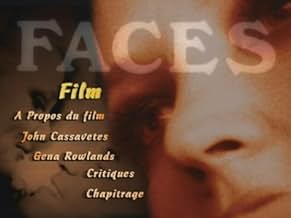VALUTAZIONE IMDb
7,4/10
12.377
LA TUA VALUTAZIONE
Un uomo di mezza età lascia la moglie per un'altra donna. Poco dopo, anche la sua ex moglie inizia una relazione con un uomo più giovane. Il film segue le loro lotte per trovare l'amore tra ... Leggi tuttoUn uomo di mezza età lascia la moglie per un'altra donna. Poco dopo, anche la sua ex moglie inizia una relazione con un uomo più giovane. Il film segue le loro lotte per trovare l'amore tra di loro.Un uomo di mezza età lascia la moglie per un'altra donna. Poco dopo, anche la sua ex moglie inizia una relazione con un uomo più giovane. Il film segue le loro lotte per trovare l'amore tra di loro.
- Regia
- Sceneggiatura
- Star
- Candidato a 3 Oscar
- 5 vittorie e 9 candidature totali
George Dunn
- Comedian
- (as George Dunne)
Recensioni in evidenza
I have only recently become acquainted with Cassavetes films and I am continually impressed. This film was made on a shoestring budget filming primarily at night because the actors had day jobs. The working title, I understand, was "Dinosaurs" which sums up things up nicely. This is an important film since it shows flawed human beings especially in a time that was truly in upheaval - the late `60's. But Cassavetes was already anticipating the attempt at overthrowing the status-quo. This is a hard but fascinating film to watch. The masks, the self-loathing, the fear, the confusion of intimacy, the now tired slogan of the war between the sexes with entertainment all driven by prescription pills, alcohol and cigarettes...it's all here. Is it "real" or is it "contrived"? Even a well acted scripted play still can penetrate us. The people and conversation "inane"? You bet. Go to work or a club and listen closely -- we live lives that should never be filmed. Cassavetes films as if he's eavesdropping. Lastly - I could not imagine this film or 'Shadows' in anything but b/w....even if he COULD have afforded color stock. Excellent film.
10Dr.Mike
Faces is one of the first American films to reach to the >core of people's relationships. It provides wonderful insight into a lifestyle that is distinctly American. The detached way that the characters interact most of the time is only a logical conclusion of the commerce-driven world we live in. The film is personal in a way that many European films of the 1950's and 1960's were. Even the title suggests the intimacy of the film and its treatment of its characters.
Cassavettes must have been repulsed by the insincerity of the people who were surrounding him when he wrote Faces. Few films have so many moments where characters are together but not talking to each other. They are merely talking, or laughing, or singing, doing anything they can to avoid having to confront the other person. Only once, when the young lover boy talks about the mechanical nature of people in America, do we even get any hint that the filmmaker is put off by the behavior of his characters. The rest of the time he merely films them and shows us what they do. This unsentimental approach can leave the viewer feeling a bit odd, but it works very well in the end. By seeing these character's shortcomings without any hint of disapproval from the filmmaker, the viewer is forced to consider their own lives and the people around them. It allows for an honesty not found in any, I repeat ANY other American film of the 1960's. Even Who's Afraid of Virginia Woolf has some indications of Nichols' attitude towards the material. Faces is just the facts.
I can only imagine the excitement that people interested in film must have felt upon the release of this film. Here was a personal, Bergman-esque film made about American people living American lives. (Note: Bergman is referenced during the film.) The quiet desperation of the housewife, the empty feeling inside the businessman, the false nature of each and every relationship speak volumes about the reality of American family life. How refreshing it must have been to see these topics approached in an American film.
The film's style is notable as well. It is independent in every sense of the word. It uses a fluid camera, freeform acting, and natural lighting. In many ways, it paved the way for a lot of the young filmmakers of the 1970's by providing them with a stylistic freedom that Hollywood had previously ignored. Today, it appears as a fairly standard film in terms of style, but at the time it was groundbreaking and exciting. In fact, it retains that excitement today, although the real revelation is how much has been taken from the film and used by others.
Faces is a great movie experience. Anyone frustrated with the lack of real connection in their lives should see it, if only to realize that many others are suffering from the same fate.
Cassavettes must have been repulsed by the insincerity of the people who were surrounding him when he wrote Faces. Few films have so many moments where characters are together but not talking to each other. They are merely talking, or laughing, or singing, doing anything they can to avoid having to confront the other person. Only once, when the young lover boy talks about the mechanical nature of people in America, do we even get any hint that the filmmaker is put off by the behavior of his characters. The rest of the time he merely films them and shows us what they do. This unsentimental approach can leave the viewer feeling a bit odd, but it works very well in the end. By seeing these character's shortcomings without any hint of disapproval from the filmmaker, the viewer is forced to consider their own lives and the people around them. It allows for an honesty not found in any, I repeat ANY other American film of the 1960's. Even Who's Afraid of Virginia Woolf has some indications of Nichols' attitude towards the material. Faces is just the facts.
I can only imagine the excitement that people interested in film must have felt upon the release of this film. Here was a personal, Bergman-esque film made about American people living American lives. (Note: Bergman is referenced during the film.) The quiet desperation of the housewife, the empty feeling inside the businessman, the false nature of each and every relationship speak volumes about the reality of American family life. How refreshing it must have been to see these topics approached in an American film.
The film's style is notable as well. It is independent in every sense of the word. It uses a fluid camera, freeform acting, and natural lighting. In many ways, it paved the way for a lot of the young filmmakers of the 1970's by providing them with a stylistic freedom that Hollywood had previously ignored. Today, it appears as a fairly standard film in terms of style, but at the time it was groundbreaking and exciting. In fact, it retains that excitement today, although the real revelation is how much has been taken from the film and used by others.
Faces is a great movie experience. Anyone frustrated with the lack of real connection in their lives should see it, if only to realize that many others are suffering from the same fate.
So this is the work of John Cassavetes? Pretty good, I must say. I definitely can appreciate good conversations and witty dialogue any day.
This film, I would say is another one of those indie films (sort of foreign-filmmaking- esque) from how it is much ado about NOTHING. I love these films. They are like a breath of fresh air. That, and they always seem so personal. I wonder if it was actually scripted or if it was improvised like most Cassavetes projects.
The only work I have seen of Mr. John Cassavetes was his depute film, Shadows, which was mainly all improve, or so he says in his interviews. I take a strong liking to these films because of how slow they are, yet SO INVITING; so UN-American, if you will. - People have said that Cassavetes brought the indie film movement to the states. So far I have not been proved wrong so far. His films, such as Faces, are all so unique and timeless. Like literally, I believe this movie will be studied until THE END OF TIME.
I like seeing people celebrating. It is nice. Gives one the feeling of calmness; like nothing extreme is happening so we don't have to waste any time stressing about it. Does that make sense?
Our main protagonist, Richard Forst (played by John Marley), is a (so called) businessman who has an affair with a much younger woman. Little does he know that his wife has some plans of her own.. You can really tell what kind of man Robert is when he says:
"I'm just a mild success in a dull profession, and I want to start over again. And I've got a bad kidney!"
This just shows what kind of person he is as he says it to the younger girl, Jeannie (played by the beautiful Gene Rowlands).
I really like the acting and love the struggles and conflict that this husband and wife go through. Both are trying to find happiness in so many ways, but is only making it worse for themselves. .
-- Michael Mendez
This film, I would say is another one of those indie films (sort of foreign-filmmaking- esque) from how it is much ado about NOTHING. I love these films. They are like a breath of fresh air. That, and they always seem so personal. I wonder if it was actually scripted or if it was improvised like most Cassavetes projects.
The only work I have seen of Mr. John Cassavetes was his depute film, Shadows, which was mainly all improve, or so he says in his interviews. I take a strong liking to these films because of how slow they are, yet SO INVITING; so UN-American, if you will. - People have said that Cassavetes brought the indie film movement to the states. So far I have not been proved wrong so far. His films, such as Faces, are all so unique and timeless. Like literally, I believe this movie will be studied until THE END OF TIME.
I like seeing people celebrating. It is nice. Gives one the feeling of calmness; like nothing extreme is happening so we don't have to waste any time stressing about it. Does that make sense?
Our main protagonist, Richard Forst (played by John Marley), is a (so called) businessman who has an affair with a much younger woman. Little does he know that his wife has some plans of her own.. You can really tell what kind of man Robert is when he says:
"I'm just a mild success in a dull profession, and I want to start over again. And I've got a bad kidney!"
This just shows what kind of person he is as he says it to the younger girl, Jeannie (played by the beautiful Gene Rowlands).
I really like the acting and love the struggles and conflict that this husband and wife go through. Both are trying to find happiness in so many ways, but is only making it worse for themselves. .
-- Michael Mendez
I'm sorry. I can't quite say I LIKED this movie. But, if nothing else, I... appreciated it. NO ONE can accuse Cassavetes of being unoriginal in any aspect of the production. Every frame of the film is remarkably unconventional. And furthermore, the performances were so starkly real it makes the prospect that there even WAS a script seem impossible to me. Now, I don't know any back story about this movie, but I'm sure there had to have been some script involved somewhere. What I'm saying is that the way the actors played it, the lines seemed... unwriteable. It's as if we were watching a documentary, but one where we can be certain those involved didn't know they were being filmed.
Basically, except for the poor dubbing that makes literally MOST of the dialogue in the film incomprehensible, I can't say there's anything about any individual sequences in the film that I disliked. HOWEVER, what I did have a problem with is this: the vanguard style of filmmaking, the characters, the situations they are in, the dialogue (if you want to call it that): does it all really come together to SAY anything? I didn't come away with any kind of an interesting or coherent message from the film. Which is fine if the scenes flow nicely together, but they really don't. Each scene as an entity unto itself is wonderful, but their juxtaposition together gets especially tiresome. I mean, for roughly 80% of the film, ALL of the characters onscreen are inebriated. Now, this makes it extremely difficult to get to know the characters beyond their buffoonish drunken altar egoes. Maybe, that was the point. I don't know. What I do know is that Cassavetes stubbornly refuses to reveal to us anything that even approximately resembles, plot, forward motion, or even... any kind of... an event... a happening until the last twenty minutes of the film when some interesting stuff finally happens. And this definitely alienates most audiences. Do you want to know why this movie has such a high rating? Because the people that didn't like it left after twenty-forty minutes. I know in the theater that I saw it in (a student film organization that watches intellectually stimulating independent fare weekly with warm response), the crowd of twenty people had been reduced by the end of the film to me, the president of the club (who was reading), and one other guy (whom I have a suspicion, fell asleep during at least part of the film) in the theater. EVERYBODY else got frustrated. Draw your own conclusions.
Basically, except for the poor dubbing that makes literally MOST of the dialogue in the film incomprehensible, I can't say there's anything about any individual sequences in the film that I disliked. HOWEVER, what I did have a problem with is this: the vanguard style of filmmaking, the characters, the situations they are in, the dialogue (if you want to call it that): does it all really come together to SAY anything? I didn't come away with any kind of an interesting or coherent message from the film. Which is fine if the scenes flow nicely together, but they really don't. Each scene as an entity unto itself is wonderful, but their juxtaposition together gets especially tiresome. I mean, for roughly 80% of the film, ALL of the characters onscreen are inebriated. Now, this makes it extremely difficult to get to know the characters beyond their buffoonish drunken altar egoes. Maybe, that was the point. I don't know. What I do know is that Cassavetes stubbornly refuses to reveal to us anything that even approximately resembles, plot, forward motion, or even... any kind of... an event... a happening until the last twenty minutes of the film when some interesting stuff finally happens. And this definitely alienates most audiences. Do you want to know why this movie has such a high rating? Because the people that didn't like it left after twenty-forty minutes. I know in the theater that I saw it in (a student film organization that watches intellectually stimulating independent fare weekly with warm response), the crowd of twenty people had been reduced by the end of the film to me, the president of the club (who was reading), and one other guy (whom I have a suspicion, fell asleep during at least part of the film) in the theater. EVERYBODY else got frustrated. Draw your own conclusions.
I see movies hoping that they're different. I've seen so many films that were exactly the same and that's really just a waste of time. Well, Faces is certainly different. It's hard to get through. It actually took me a week. That's because there is little action and it is hard to get interested in it. The reason why it's so original is because it is practcially a documentary on social life in this time period. It's as low budget as you get. Characters just hang around houses drinking and enjoying themselves. So I guess there isn't much of a plot, but on the good side this might be the most realistic movie I've ever seen. I really felt like nothing was unrealistic, not even a single one of the conversations. That's different. Most movies try to impress, but Faces tries to be natural. That doesn't make much sense because "natural" means you're not trying to do anything, you're just existing as you always do. Maybe that was how Faces was filmed. It definately feels natural and that's a big achievment.
Lo sapevi?
- QuizWhile filming a part on Polvere di stelle (1963), John Cassavetes saw Steven Spielberg lurking around the set, as he was then in the habit of doing. Cassavetes approached Spielberg and asked what he wanted to be. When Spielberg replied he wanted to be a director, Cassavetes allowed the young man to direct him for the day. He later invited Spielberg to work on this film with Spielberg serving as an uncredited production assistant on Volti (1968) for two weeks.
- Citazioni
Maria Forst: There's a Bergman film in the neighborhood.
Richard Forst: I don't feel like getting depressed tonight.
- ConnessioniFeatured in Cinéastes de notre temps: John Cassavetes (1969)
- Colonne sonoreLove Is All You Really Want
Written by Jack Ackerman
I più visti
Accedi per valutare e creare un elenco di titoli salvati per ottenere consigli personalizzati
- How long is Faces?Powered by Alexa
Dettagli
Botteghino
- Budget
- 275.000 USD (previsto)
- Lordo in tutto il mondo
- 7236 USD
- Tempo di esecuzione2 ore 10 minuti
- Colore
- Mix di suoni
- Proporzioni
- 1.66 : 1
Contribuisci a questa pagina
Suggerisci una modifica o aggiungi i contenuti mancanti



